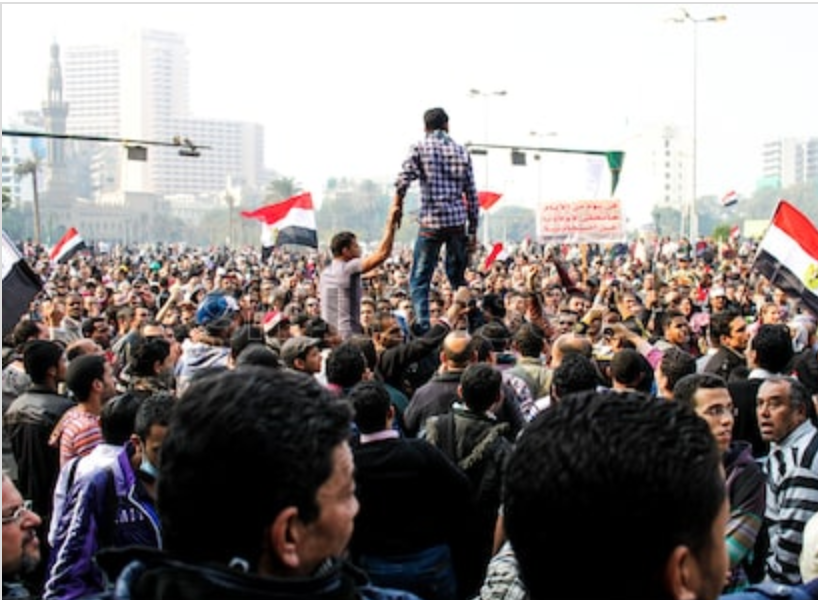Protests emerged this past weekend in Cairo and other major Egyptian cities as the citizens become fed up with their government. President Abdel Fattah el-Sisi assumed power in a 2013 military takeover and exhibits all of the characteristics of an authoritarian ruler (Kirkpatrick 1). He has violently suppressed dissenters, rigged the most recent election, monopolized the media for pro-government propaganda, and recently altered the constitution to extend his rule. This type of behavior tends to be met with Western disapproval and sanctions; however, although human rights groups regularly denounce his government, Western leaders offer little criticism, and President Trump even called him “my favorite dictator” (Campisi 1). Furthermore, since Mr. el-Sisi’s rule began, Egypt has faced very few threats to their internal sovereignty. Mr. el-Sisi’s gained his legitimacy from his pragmatic appeal to the Egyptian people as the leader who could save Egypt from the poor rule of their former Democratic President, Mohammed Morsi, yet his legitimacy seems to be wearing off. According to Egypt’s official statistics agency, “In July… 33 percent of Egyptians were living under the poverty line after years of austerity measures, up from 28 percent in 2015 and 17 percent in 2000” (Walsh 2). This sharp economic decline spurred the Egyptian people to question Mr. el-Sisi’s rule. The most recent protests, the first major protests in el-Sisi’s reign, were prompted by the former military worker and current self-exiled Egyptian Mohamed Ali. Ali posted a series of videos where he accused the government of “widespread squandering of public funds under Mr. el-Sisi and his close aides.” Ali went on to encourage the Egyptian people to take to the streets and protest the current government. These demonstrations were downplayed by the national media, but online videos show the high degree of civil unrest in Egypt. These protests mark a historic first for the el-Sisi government, and it seems unlikely that these will be the last of the Egyptian protests.
The current situation in Egypt connects to this semester’s themes of regime transitions and state strength. Mr. el-Sisi came to power via a military takeover, and as exhibited in other case studies, such as Nigeria, military coups typically lead to governmental instability. The regime in Egypt also transitioned from a flawed democracy to a de facto authoritarian regime. These regimes can be stable even in weak states; however, Mr. el-Sisi’s waning legitimacy serves as the impetus for the Egyptian’s protests. Two key aspects of a state’s strength are legitimacy and internal sovereignty. Legitimacy can be earned and lost in a variety of ways. Mr. el-Sisi earned his legitimacy by helping overthrow the previous insufficient regime; however, his inability to provide economic prosperity along with his obvious authoritarian leadership style has caused many Egyptians to view el-Sisi’s rule as illegitimate. Furthermore, their illegitimate view of el-Sisi’s government has led to protests that threaten the states internal sovereignty. When citizens revolt and question the state’s government, the state’s strength weakens. According to the most recent fragile index scores from 2019, Egypt ranked as the 34th weakest state with a score of 88.4. Egypt’s unstable regime, as well as the threats to their internal sovereignty and el-Sisi’s declining legitimacy, could weaken the state even further.
Egypt is on the brink of chaos. They face another impending regime change, an overthrow of the current government, or at least more civil disobedience. These first protests end a period of relative, albeit short, peace in Egypt and begin the process of the potential downfall of Mr. el-Sisi and his government. The Egyptian people honor democratic values, at least more than authoritarian ideals, and economic success, and el-Sisi currently fails to provide either of these to the Egyptian people. If the protests continue, the Western world will get involved to stabilize the state. In the next coming months, Egypt’s government will re-enter the national spotlight. Although the clock seems to be ticking for Mr. el-Sisi, authoritarian leaders tend to not give up their power quickly or quietly. Mr. el-Sisi will undoubtedly attempt to win back his people or at least secure his control over the region by violently punishing dissenters. Is it too late for Mr. el-Sisi to maintain his authoritarian rule and does he have any options that would relegitimize his government?
Works Cited
Campisi, Jessica. “Trump Called out for ‘My Favorite Dictator’ While Awaiting Egyptian Leader at Summit: Report.” The Hill, 13 Sept. 2019.
“Fragile States Index 2019.” The Fund for Peace, 10 Apr. 2019.
Kirkpatrick, David. “Army Ousts Egypt’s President; Morsi Is Taken Into Military Custody.” The New York Times, 3 July 2013.
Walsh, Declan. “Rare Protests Against Egypt’s Leader Erupt in Cairo and Elsewhere.” The New York Times, 20 Sept. 2019.


I find your blog post very intriguing. The economic inefficiency to properly distribute and allocate resources by the Egyptian government seems to be its major downfall. Countries that live under authoritarian regimes who have thriving economies tend to not have active protesters revolting against the government in power even if there are human rights that are being violated in return – remember Singapore. Having the ability to make enough money to appease one’s close supporters and the people is rarely achieved. If Sisi ruled under a flourishing economy, I don’t believe he would be seeing these protests despite his authoritarian tendencies. In our class discussions, we talk about authoritarian leaders and how they succeed in keeping power. Clientelism, pragmatic appeal, repression, and predation are all forms of maintaining legitimacy, but it would seem that Sisi has not provided enough of one or the other to remain fully in power. The most important indicator, I believe, whether or not Sisi has truly lost his power is if he loses control over the military which would likely result in a regime and/or government change. While it may not be too late to for Sisi change his policies to maintain his authoritarian rule, these protests will have a lasting effect on Egyptian citizens’ viewpoint towards his legitimacy.